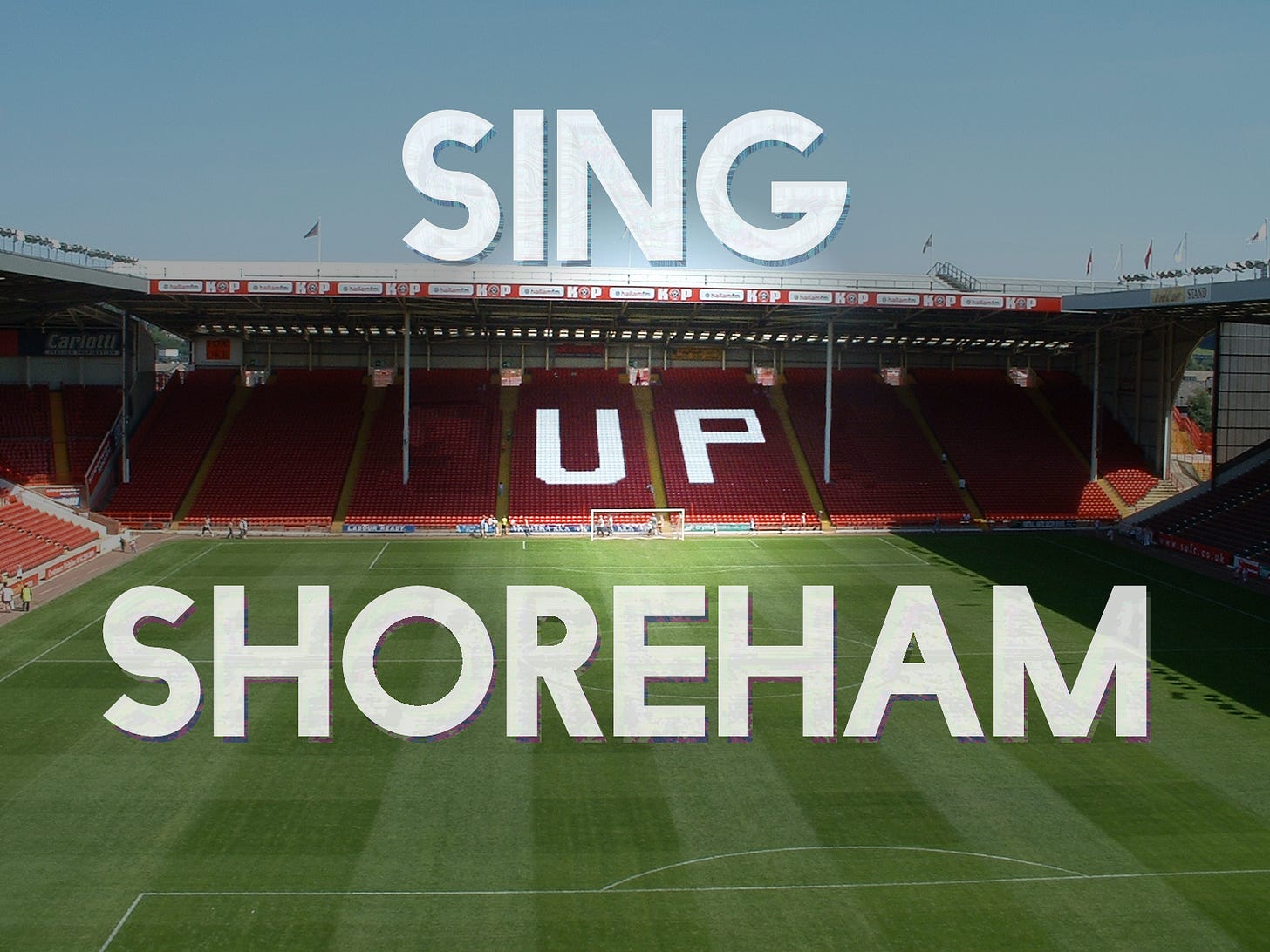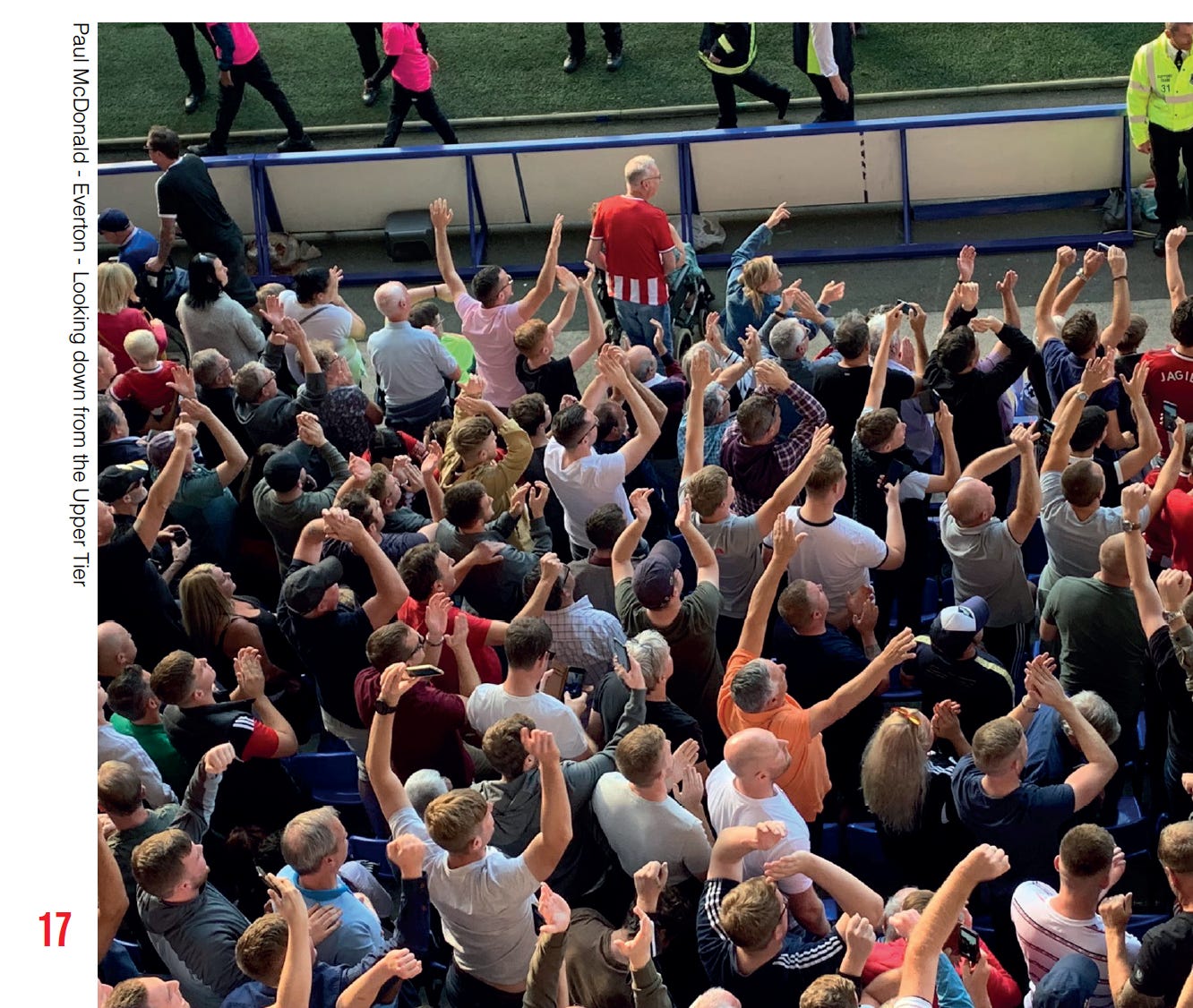Sing up Shoreham
The fan effect is real and we need to make more noise
The Pinch has been shortlisted in the ‘Fan Media of the Year’ category in the Football Supporters' Association Awards 2022. We’d love it if you could spare ten seconds to vote for us in Category 4).
Sing up Shoreham
Words by Sam Parry
After the Blades drew 3-3 with Blackpool, Paul Heckingbottom was quoted in the Sheffield Star saying this:
I want more from every fan, just like every player. That's my job, to always try and get more….There was a moment when I thought the fans were great. It might have been when Rhian [Brewster] missed the penalty. We were losing the game 3-2 and all of a sudden, they started again. That's what I'm after from the fans.
Those words chime with me like the bells of St Mary’s at two o’clock.
After the QPR game, I had a moan on the DEM Blades Twitter account about my sense that home supporters were too quiet. Quieter than usual. And usual, I’m sorry to say, is about as noisy as a bibliophile dropping their armful of borrowed books to the shushes of the resident librarian.
As fans, I think we can give “more,” specifically when United play at Bramall Lane. I also think it’s important that we do. Because - and here’s the argument - the fan effect is not only real, but it can also improve performance.
Don’t get The Pinch sent directly to your inbox? Sign-up now.
The Fan Effect
In the Bundesliga 2019-20, when supporters were absent during COVID-19, home teams won 21.7 per cent of their games. What happened to that number when fans came back? Well, home teams won 43.3 per cent of games. There’s home advantage, and then there’s home-with-a-crowd-advantage.
Still, that’s only one set of numbers from a league outside of England. Perhaps it’s arbitrary stuff, but I think not. Corroborative evidence comes by way of a study by The Times, which found that home teams who play in front of a crowd score 37 per cent more goals than away teams. Moreover, the study goes on, “home teams in Europe’s biggest five leagues win about 45 per cent of matches”.
We might not belong to one of the “biggest five leagues”, yet our form under Heckingbottom correlates with that natural home advantage. At home, Heckingbottom has taken 47 points from 21 home games, at 2.23 points per game. However, the last three games at Bramall Lane (draw, loss, draw; 1 point) is the single worst three-game home spell since Slaviša Jokanović was replaced (previous worst was win, draw loss; 4 points).
The cause of that mini-slump - or to use the language of the government, that aggravating event - can be put down to injuries, good opposition and poor performance. Nevertheless, faced with a hailstorm of poor form, should we not pull up our collars and do our utmost to spin the weathercock towards a sunnier, tub-thumping, home-with-a-crowd-advantage?
It may soothe our vocal cords if we act on the assumption that elite athletes should perform to elite standards regardless of their recourse to a supportive crowd. However, I’d sooner reach for the Strepsils after barking my way through ninety minutes than dice with the changing winds of the football gods. Because, truthfully, home fans make a massive difference. Look at Euro 2020. Look at London 2012. Look at the 2019 Cricket World Cup Final. Look at Euro ’96. Look at 1966.
Is it a surprise to see the home team doing better than most when they play on home turf with home supporters? No, it’s not. If we can make Bramall Lane feel absent of away fans, the rewards are there for us to reap.
A 2018 paper by Tilburg University and the University of Lausanne found home fans provided their team with a competitive advantage when away fans were absent:
This study presents evidence on the role of moral support on performance in a competitive environment. We take advantage of an unusual change in the Argentinean football legislation. In August 2013, as a matter of National security, the Argentinean government forced all the teams of the first division to play their games with only home team supporters. Supporters of the visiting teams were not allowed to be in stadiums during league games. We estimate the effect of this exogenous variation of supporters on team performance, and we find that visiting teams are, on average, about 20% more likely to lose without their supporters.
There’s plenty of evidence to suggest that home fans improve performance. And I doubt I need to convince any reader that we should try and secure whatever competitive advantage we can. But the trickier and more interesting question, I think, is why do home fans secure an advantage?
Why?
Picture the scene. An out-of-shape forty-something decides to set themselves the goal of running a 10k with a week’s notice. They train a couple of times. Regret their decision. Still, they turn up and take part. The starting gun fires, and they make it to 3k in decent nick. They get to 5k, and things start to become a struggle. They’ve slowed to little more than a walking pace by 7k. And at 9k, they reach the final thousand-metre stretch, which, of course, takes place up a monumentally steep gradient. They fall flat. They’re at the point of giving up. Legs burning. Lungs aching.
But then, a miracle. Except it’s not a miracle, it’s science. The hill is lined with friends, family and strangers offering encouragement.
Go on, you’re nearly there!
That encouragement proves enough for the out-of-shape runner to focus on the frenzy of waving arms, to forgo fatigue and push beyond boundaries their body is desperately trying to impose. They finish the race. Exhausted, yes. But they finish.
And they manage it because it turns out that fans distract performers from fatigue. That’s right. Crowds don’t necessarily need to be motivators. Their presence offers athletes a diversion strategy away from pain or exhaustion, so, instead of hitting a wall, they smash through it. Fans don’t have to gee-up the players, they just have to turn up and make a bit of a ruckus.
And there’s more. The spectacle of a rocking Bramall Lane can be motivating in itself. A study shows that crowds leave a visual impression on athletes. A virtual representation of encouragement so powerful that it offers a physical and psychological boost. In fact, the physical strength of athletes in the throes of a spectacular and supportive mob of their own can boost their strength by up to 8 per cent.
Suffice it to say that there’s a pretty definitive body of evidence, which to my mind, should be instructive when it comes to the choices Unitedites make about making a racket. To sing or not to sing: if that’s the question, I’d hate to hear the answers.
KOP out
Whilst we can’t be the “twelfth man”, we can make a difference. The fan effect is not merely a marginal but a substantial gain. The net benefits of a roaring KOP could be points on the board, and we all want that.
Now, I’m quite happy to cop out on the chicken-and-egg argument of whether players should get fans going or fans get players going because I think such protestations miss the point. Fans don’t score goals.
Whether Paul Heckingbottom’s team are making errors or memories, I think they’ve banked enough credit to earn our vocal support, win, lose or draw. So I say Sing up Shoreham, not because the team are playing well; but so they can rely on the distractions, the motivation, and the competitive advantage that only Blades fans can offer.
Sam Parry is the co-founder of DEM Blades fanzine and Commissioning Editor of The Pinch. Inside work he writes speeches, and outside of work, he wonders whether he’s ever eaten a truly greasy chip butty.






Thanks, Sam
It certainly is a dichotomy, this, and I can see both sides. Being a bit of an introvert and sitting in a ‘staid’ area of the South Stand, I admit I never join in singing, but oh what a difference it does make when the sound is reverberating excitedly around Bramall Lane, even to me as a supporter, so I can see that it surely must make a difference to the players.
And at the end of any game where there have been lots of goals scored, lots of chances taken and the team is on fire, the scenes afterwards of the players dancing towards the Kop (or the faithful 'away' supporters) and the Manager inciting the crowd more and more, the noise and passion is palpable.
The other side is, of course, that when the team’s not doing so well, I guess supporters are either less interested in a game that’s petering away to a loss or think ‘why should we sing when the players aren’t putting in any effort?’ and everything goes the other way into a sort of vicious circle . . . which really goes to prove that a vocal support does matter and more effort can probably be put in by the players with that support.
“Whether Paul Heckingbottom’s team are making errors or memories, I think they’ve banked enough credit to earn our vocal support, win, lose or draw.”
Very true. So although I don’t sing myself, I still echo “Sing up Shoreham”!!
Sue.
Pretty obvious otherwise there would be no home advantage no?